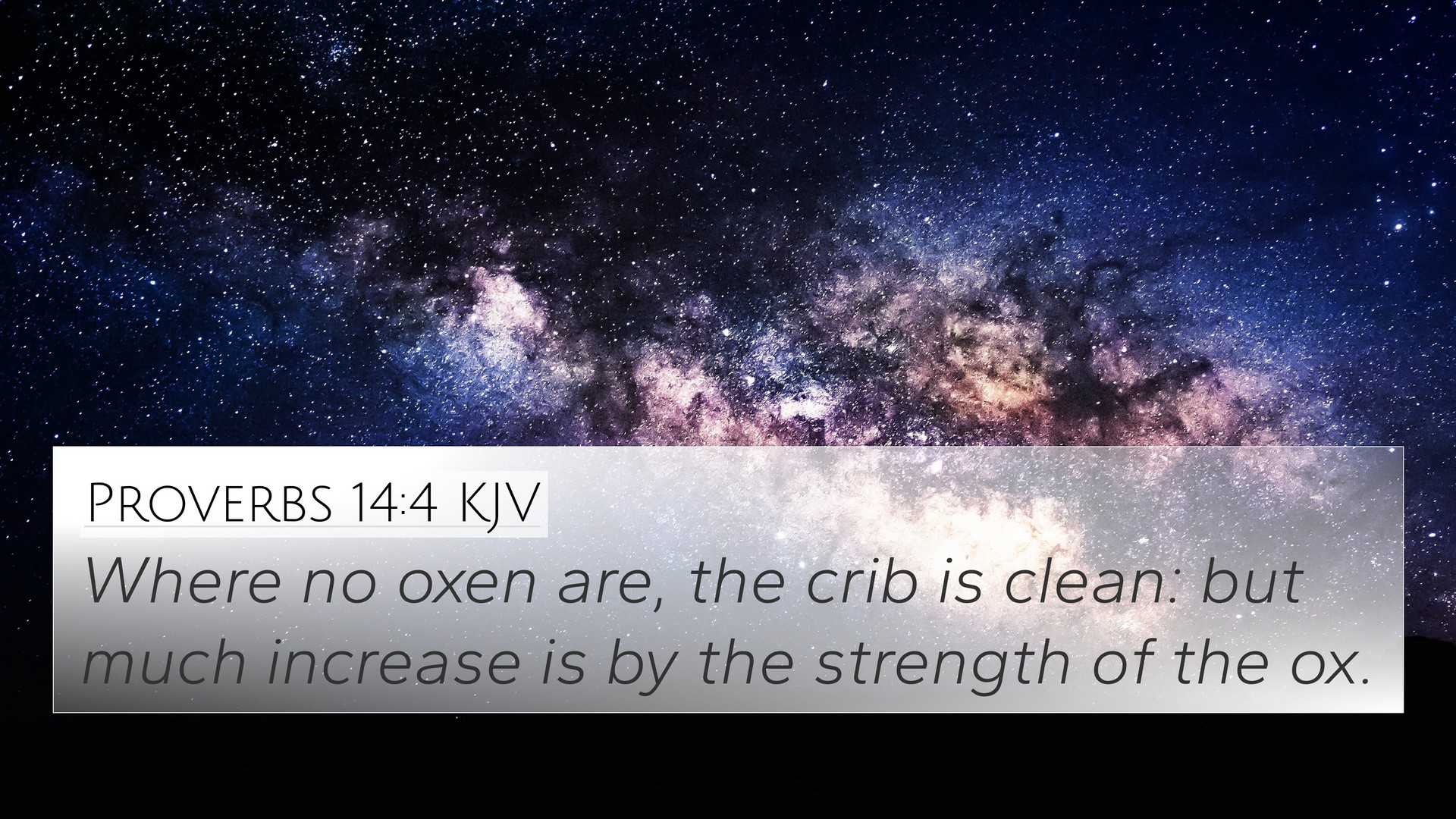Proverbs 14:4 - Summary and Interpretations
Bible Verse: Proverbs 14:4 states, "Where no oxen are, the trough is clean; but much increase is by the strength of the ox." This verse highlights the necessity of accepting the mess that can come with the blessings and productivity that result from hard work and the use of resources.
Meaning and Insights
This verse serves as a profound analogy about the balance between effort and cleanliness, productivity and chaos. Below are insights drawn from public domain commentaries by Matthew Henry, Albert Barnes, and Adam Clarke.
1. Matthew Henry's Commentary
Henry suggests that this verse speaks to the practical realities of life. The presence of oxen represents labor and productivity; they contribute to agricultural success but also to the messiness of farming life. In a broader sense, Henry warns about the danger of wanting a ‘clean’ life devoid of both effort and the challenges that come with working hard and achieving success.
2. Albert Barnes' Commentary
Barnes elaborates on the implications of not having oxen. He points out that absence of labor leads to cleanliness of circumstances but at the cost of potential growth. The absence of effort results in the absence of reward. He emphasizes that substantial gains require diligence and the willingness to handle the responsibilities and challenges that come with them.
3. Adam Clarke's Commentary
Clarke adds a practical application: while it may be easier to maintain a clean and orderly environment without the input of oxen, true success and bounty often come from engaging in hard work. Messiness is part of fruitful labor, and one should be prepared for difficulties when striving for a greater outcome.
Bible Verse Cross-References
- Proverbs 12:11: "He who works his land will have abundant food, but he who chases fantasies has no sense."
- Proverbs 10:4: "Lazy hands make a man poor, but diligent hands bring wealth."
- 2 Thessalonians 3:10: "For even when we were with you, we gave you this rule: 'The one who is unwilling to work shall not eat.'
- Ecclesiastes 9:10: "Whatever your hand finds to do, do it with all your might."
- Colossians 3:23: "Whatever you do, work at it with all your heart, as working for the Lord, not for human masters."
- Proverbs 21:5: "The plans of the diligent lead to profit as surely as haste leads to poverty."
- Galatians 6:9: "Let us not become weary in doing good, for at the proper time we will reap a harvest if we do not give up."
Theme Analysis and Related Teachings
Thematically, this verse relates to other Biblical teachings that encourage diligence, hard work, and the acceptance of life's messiness in pursuit of greater goals. It resonates with various Biblical narratives about farming, stewardship, and the virtue of labor.
Connections Between Bible Verses
Understanding Proverbs 14:4 in the context of other scriptures enriches our appreciation of its message. For instance:
- 1 Corinthians 3:8: "The one who plants and the one who waters have one purpose, and they will each be rewarded according to their own labor." This verse echoes the importance of labor and the eventual rewards of diligent work.
- Hebrews 6:10: "God is not unjust; he will not forget your work and the love you have shown him as you have helped his people and continue to help them." This emphasizes God's recognition of our hard work.
Practical Application of Proverbs 14:4
Understanding the implications of Proverbs 14:4 is vital for personal and spiritual growth. Here are ways to apply this verse:
- Embrace Challenges: Understand that pursuing significant goals will often involve facing difficulties and managing messiness.
- Value Hard Work: Stay diligent in daily tasks and responsibilities, knowing that they contribute to larger results.
- Accept Imperfection: Realize that achieving your goals may sometimes mean dealing with less-than-ideal situations.
Final Thoughts
Proverbs 14:4 invites us to reflect on the balance between effort and the outcomes of that effort. In many ways, life mirrors this reality; the messiness and obstacles often pave the way for blessings and abundance. By considering this verse alongside related scripture, we can cultivate a deeper understanding of Biblical principles regarding productivity, work ethic, and the acceptance of life's complexities.





